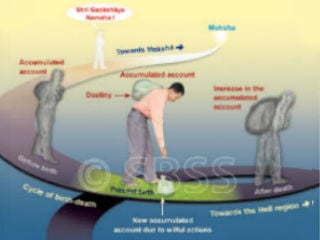Mentioned ahead are the five factors operating towards the accomplishment of tasks. The venue of the karma (An act or action which gives rise to destiny) [that is the body], the doer, various senses, their different functions, and the presiding divinity.
A. Adhishthan (Foundation or support) : Apart from the support being available at the gross level, the resolve of the mind is the very foundation of every task.
B. Capability : The capability of the doer and the ability to take the task to completion.
C. Karan : Tools required for the successful completion of a task.
D. Karma : Practical kruti (Deed).
E. Luck : Luck helps in making a task a success or a failure. If luck is favorable, it helps in making the task successful; however, if unfavorable, it renders the task unsuccessful.
The amazing fact is that from among the factors required for the total success of the Karya, the factor with maximum importance is destiny and it carries about 65% importance.
Destiny and efforts are both equally important: Mere luck or efforts alone do not take a task to its logical end; it is the union of both that ensures the success of any task.
Learning about the luck factor : Even an intelligent person will find it difficult to perceive by reasoning, whether his luck is favorable or not for the success of a task. In this context, paths mentioned ahead are likely to be successful.
- Consulting Saints who are endowed with the supernatural power of knowing the future, or spiritually evolved seekers.
- Consulting astrologers
1. Importance of the ‘right time’
Commencing a task at any odd time does not fulfill the intent of the doer. However, if the same is done at an appropriate time, it is highly beneficial. Only he who can judge the appropriate time can accomplish his task.
Example of revolutionary Vasudev Balwant Phadke explains the importance of timing in carrying out a task. Vasudev Balwant Phadke is foremost amongst those who attempted to revolt against the British rule. Prior to the execution of his own ideas about raising a revolt against the British rule, he had visited evolved men such as Shri Akkalkot Swami, Shri Nrusinh Saraswati, Shri Manikprabhu and Shri Kalbuva; however, none supported his ideas, simply because the time was not right. Yet, Vasudev Balwant Phadke strongly felt that ‘however strong be the level of preparedness, yet the revolution must have Divine blessings’. As a final attempt, he went to meet Shri Maharaj at Gondavale in Maharashtra. The following conversation ensued. He said to Maharaj, “I have made all arrangements. Even my men are ready. You are akin to Saint Ramdas (Guru of the great Maratha king, Shivaji Maharaj). I will play the role of Shivaji. Please help me”. To this Shri Maharaj replied, “Oh no! Neither am I Ramdas nor can you be Shivaji. The (present) time is not favorable. Do not waste your energy. Continue to worship God so that your activity gains strength. The appropriate time is yet to come”. Vasudev Balwant was infuriated by these words and took leave of His Holiness right away. Shortly thereafter, he raised the banner of revolt, and in no time became very famous. Finally, the British Government treacherously arrested and prosecuted him. Four years later, he died in a prison in Aden. Not heeding to the advice of Saints, Vasudev Balwant Phadke attempted to move against time and was not successful in his mission. In short, performing anything that is in tandem with the times becomes effortless.
2. Importance of the place and time
The wise should perform acts of bravery only after confirming the suitability of the place and time; for, an act of bravery performed after crossing the suitable place & suitable time is futile. Since place and time carry so much importance, the scriptures advise the pronunciation of deshkal (Place and time) during Shodashopachar pūja (Ritualistic worship involving sixteen specific steps) or any other pūja performed by making a resolve.
3. Co-operation of the constituents of nature is necessary for karma
It is utter foolishness to harbor the ego that, “I am performing a particular task solely on my own”. For example while cooking, besides the ingredients, the heat from the fire, fluidity of the water, etc. are vital. Thus, it can be ascertained that a karma is possible only by striking the right balance of the known and the unknown activities in the Universe and the efforts of mankind.
4. Efforts and God’s grace
Sometimes, no matter how hard a person tries, yet he does not succeed. At such times be assured that the person’s prarabdha (Fate) is severe. However, if the person putting in efforts is a devotee then because the efforts are backed by spiritual practice, he gets Divine help and the efforts are rewarded with success.
Therefore, Samarth Ramdas Swami has said, “One might have a strong cause and the capabilities to support the cause; yet success is possible only with divinity for the foundation”. Accordingly, we should have faith in God and keep trying while performing every karma.
Efforts need to be backed by faith. As is one’s bhav (Spiritual emotion), so does he receive God’s grace.
5. While performing karma, having an attitude
of ‘performing karma assigned by God’ is important
It is obvious that some incidents in life will be distressful; however, there are times when things happen as per our wishes, yet we may not derive the expected pleasure or satisfaction. The solution to such a situation is performing the tasks with the bhav that, “I do not perform the karmas. It is the service unto God that I render through the karmas that have come rightfully to me as my share, with the energy and intellect that He has given me”. Having such an attitude and performing karma while chanting God’s Name will give us peace, contentment, love, and Anand (Bliss). Anand is derived from every karma performed by the Saints. The attitude is the key. When the mind is content, the tasks performed by that mind also impart contentment.

 Using Kriyaman-karma effectively
Using Kriyaman-karma effectively Importance of Kriyaman-karma in overcoming Prarabdha-karma
Importance of Kriyaman-karma in overcoming Prarabdha-karma How to overcome sufferings of Prarabdha
How to overcome sufferings of Prarabdha Facing the consequences of Prarabdha
Facing the consequences of Prarabdha What is Sanchit-karma and Prarabdha?
What is Sanchit-karma and Prarabdha? Kartavya (Duty) karma
Kartavya (Duty) karma